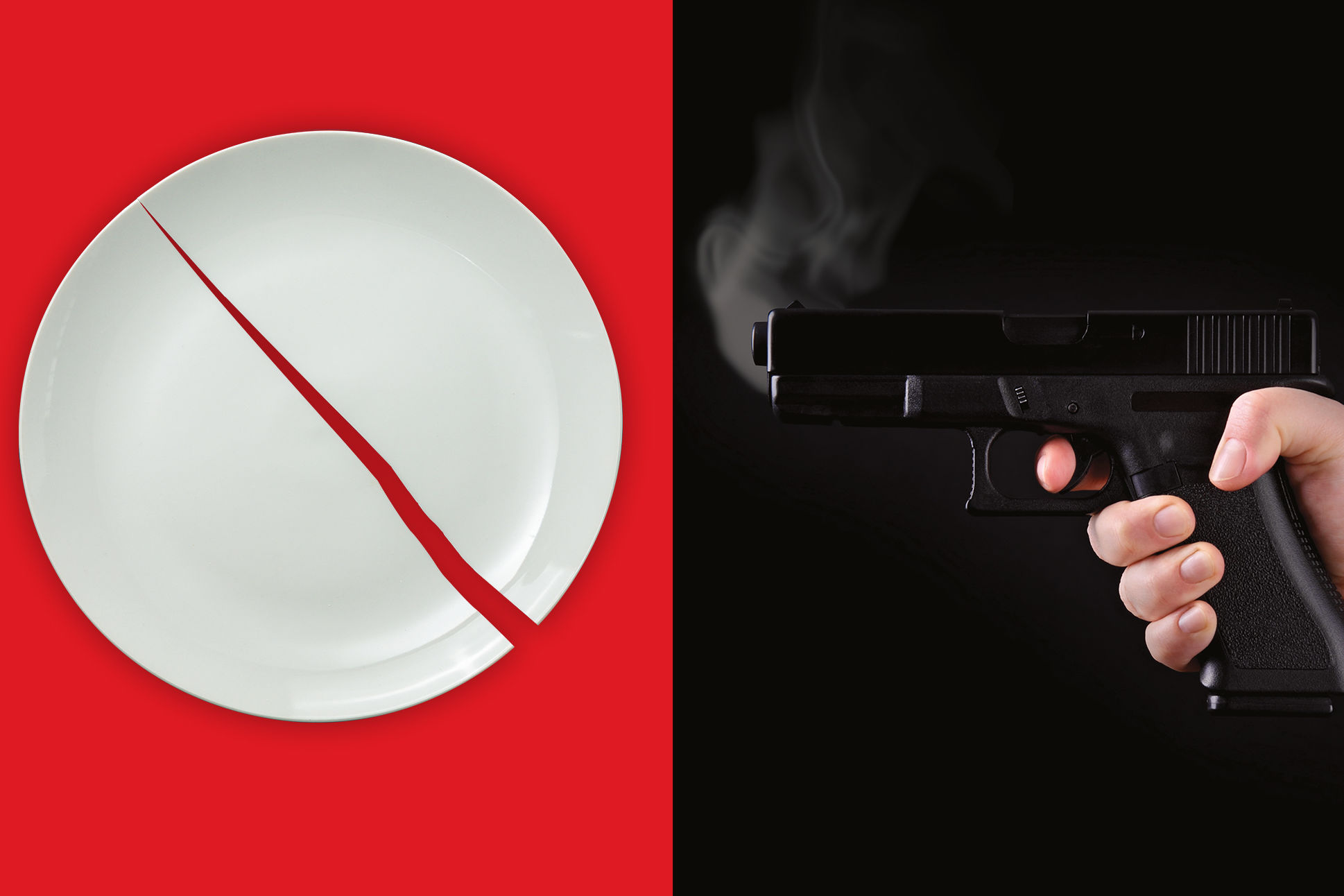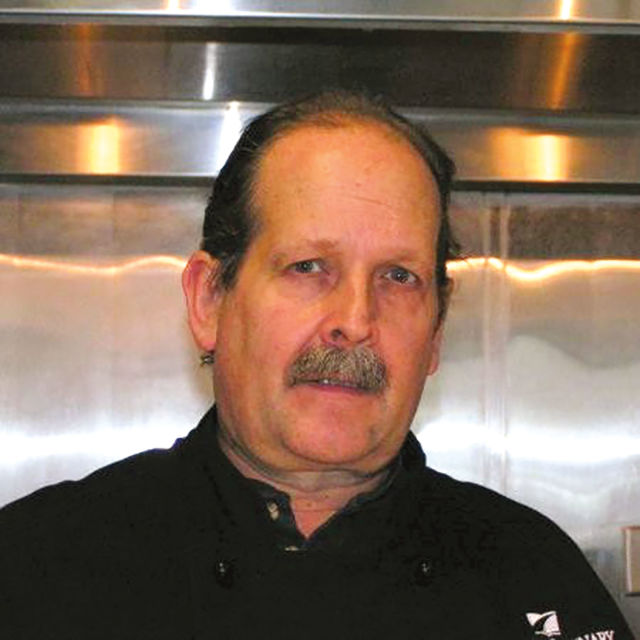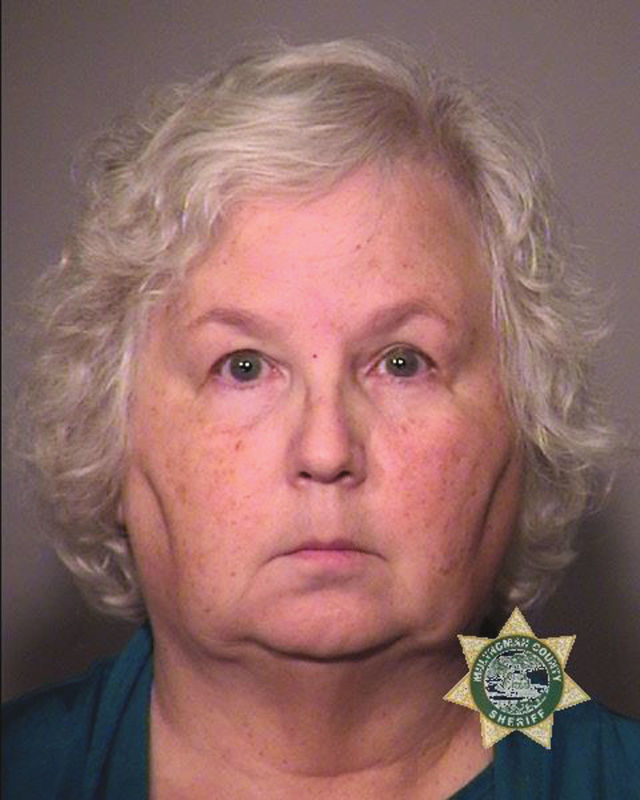
A Beloved Culinary Instructor Was Murdered. What Happened Next Was Stranger Than Fiction.
It’s early April, and students at the Oregon Culinary Institute are bustling around the Portland school’s tidy restaurant, practicing skills learned in the classroom by preparing lunch for the public. Louis Armstrong croons quietly as they carefully plate radicchio salad and tender, pan-seared cod. A server—another student—recommends the chocolate dream torte for dessert as an instructor in a checkered shirt calls out orders, helping conduct the cooking and serving of each three-course meal. “Fish, fish,” he says. “Table five.”
The school is a comfortable space. It’s calm. It’s also where, on the morning of June 2, 2018, students found the body of their teacher, Daniel Brophy, covered in blood.
The story of Brophy’s death, and who may have killed him, has captivated Portland, and the country, over the course of the past year. But as prosecutors and public records reveal more about the case, a pat plotline has emerged that wouldn’t survive a writers’ room on Law & Order. The twists are too on the nose. The evidence is cliché. So is the old adage “truth is stranger than fiction.” But the issue—for jurists, lawyers, and friends and family of the admired Portland chef—may be figuring out one from the other.

Dan Brophy, from his LinkedIn profile
Image: Courtesy LinkedIn
D
aniel Brophy arrived at the Oregon Culinary Institute that June morning in 2018 to teach. It was a cool Saturday, and the school for aspiring chefs, just west of downtown Portland in the Goose Hollow neighborhood, offered weekend courses. Brophy had worked there since 2006. More than a decade later, he wielded his kitchen knife as lead chef instructor— “the resident encyclopedia of knowledge,” his faculty biography said. On the left breast of his black uniform, his name was stitched in white cursive: Chef Brophy.
He was alone that morning as he disarmed the school’s security system, but a colleague was not far behind. She arrived about 10 minutes later, at 7:30 a.m., and opened the doors to students at 8. That’s when they found Brophy bleeding in the building’s rear kitchen.
Sirens screamed as police and medics rushed to the scene. Chef Brophy was a stalwart at the school, a man who recited the same, teasing speech on the first day of each term, warning students against whistling or grinning in the kitchen—smiling could sully food, he said. Later in the school year, he would take them foraging for mushrooms in the forest or digging for clams in Oceanside.
Brophy’s wife, Nancy, was nearly as well-known among the students. He was the chef and she was “The Management,” as he good-naturedly referred to her in his classes. Not long after detectives arrived at the school that day, so did she. Someone had called her at home about an incident at the institute, she said, and she drove there from their house in Beaverton.
He had been shot twice, once in the chest and once in the back. By the time the medics arrived it was too late. Both bullets had pierced his heart.
Police puzzled over the scene. It didn’t seem like a robbery: Brophy still had his wallet, cell phone, and keys, and his 2010 Toyota Tacoma was parked outside. There was no sign of a struggle. No forced entry. There were no other victims. And, for the moment, there were no suspects. Nancy couldn’t think of anyone who would want to hurt him. He didn’t have any enemies.
Nancy and Dan—she called him Dan—had been married for 27 years, nearly half of his life. He was 63, and she was almost 68. On Facebook, the day after the killing, she grappled with the death of her husband “and best friend.”
“For those of you who are close to me and feel this deserved a phone call, you are right, but I’m struggling to make sense of everything right now,” she wrote. “While I appreciate all of your loving responses, I am overwhelmed. Please save phone calls for a few days until I can function.”
She included the details of a candlelight vigil to happen at OCI, and the next evening she joined students, teachers, and friends as they remembered Dan.
“He loved teaching, he loved mushrooms, and he loved family,” Nancy said to the hundreds of people gathered in the school’s parking lot. She wore black, glasses hanging from a strand of beads around her neck. “Dan was one of the very few people I’ve known that knew exactly what he wanted in life and loved doing it.”
Linda Solarek, who lived next door to the Brophys, stood in the back of the crowd. In Beaverton, when she saw Nancy walking her dogs, two shih tzus named PB and J, she hugged her.
“I just can’t wrap my head around it,” Nancy said. She seemed in shock.
“It’s been hard,” Arun Singh remembers the new widow telling her when Singh gathered her children to knock on her neighbor’s door and offer their condolences. Tamara Alva, who did yard work for the couple, said Nancy was “a mess” when she checked on her. As the weeks went by, Nancy started to talk about moving. She told a third neighbor that she was haunted by Dan’s side of the bedroom. Thinking about him upset her. She wanted to get away from the house.
Just three months later, on September 5, 2018, she was escorted out. Portland police officers were taking her into custody.
“You’re arresting me?” Nancy said. “You must think I murdered my husband.”

A September 2018 Multnomah County Sheriff’s Office mug shot of Nancy Brophy
A
nyone is capable of murder if they’re pushed far enough, Nancy Brophy wrote in 2011. The blog post, on a forum for female writers, is titled “How to Murder Your Husband.” The woman from Wichita Falls, Texas, an economics major at the University of Houston, was by then a “romantic suspense writer”—her words. She wrote lusty, winding novels about women in trouble and men to the rescue.
Sometimes, her characters seemed to speak in the author’s own sexagenarian voice. “Oh, Lord,” a beautiful, blonde, 33-year-old thinks as she tries to flirt for the first time since high school. “Nuts,” curses her love interest, a ripped former Navy SEAL. “Just the sound of his rough, arousal-laden voice had her sex clenching ...” Brophy writes in one book. “But a lifetime of experience screamed, danger, danger, danger.”
The books are self-published, with typos and overwritten pages, but they’re also brisk and beachy, and they have fans on Goodreads. Writing such fiction led her to think often about murder and police procedure, she said in the blog post. She laid out possible motives. Maybe, she said, he’s cheating. Or maybe you’re in love with someone else. And then there’s always money.
“Divorce is expensive, and do you really want to split your possessions?” she wrote. “Or if you married for money, aren’t you entitled to all of it? The drawback is the police aren’t stupid. They are looking at you first.”
She dismisses guns as murder weapons. “Loud, messy, require some skill. If it takes 10 shots for the sucker to die, either you have terrible aim or he’s on drugs.” Ditto hit men. (“Do you know a hit man? Neither do I. And an amazing number of hit men rat you out to police.”)
In the end, she writes, “I find it easier to wish people dead than to actually kill them. I don’t want to worry about blood and brains splattered on my walls. And really, I’m not good at remembering lies.”
Prosecutors say she lied. On September 13, 2018, a grand jury indicted Nancy Lee Crampton Brophy on one count of murder with a firearm constituting domestic violence. She had no criminal history. Four days later, she pleaded not guilty.
She had told police she was home when she learned something happened at the culinary institute the day her husband was killed. But a surveillance camera recorded her driving her Toyota minivan west on Jefferson Street, directly in front of the school, at 7:08 a.m.
At 7:21, Dan disarmed the school’s alarm. At 7:28, the surveillance camera again captured Nancy driving on Jefferson Street. At 7:30, Dan’s colleague arrived at OCI, and at 8, his body was discovered as students entered the kitchen.
On June 5, three days after Dan was killed, Nancy called Darren Posey, a detective at the Portland Police Bureau. She asked for a letter confirming she wasn’t a suspect in her husband’s death, according to documents prosecutors have filed in circuit court. She was the beneficiary of a $40,000 life insurance policy, she said, and she wanted to assure the insurance company that she hadn’t killed her husband.
Investigators later discovered that there were several more policies in Dan’s name. In all, Nancy was the beneficiary of more than $350,000, according to prosecutors. She once worked in the insurance industry, detectives say, and sold life insurance policies.
The Multnomah County district attorney’s office, the Portland Police Bureau, and Nancy, via her lawyer, declined to comment on the ongoing case. But court records detail more evidence authorities say they have against her.
As detectives searched Dan’s phone for clues, they discovered an article bookmarked on an iTunes account he shared with his wife, titled “10 Ways to Cover Up a Murder.”
An analysis by the Oregon State crime lab concluded that the bullets recovered from Dan’s body were most likely shot from a Glock 9 mm handgun, a weapon Nancy told detectives she had recently purchased though she said neither she nor her husband had used the gun. After the crime lab looked at it, a forensic scientist determined it likely wasn’t the gun that had killed Dan.
During an April court hearing, though, a prosecutor said Nancy purchased additional gun parts online before Dan’s death. The Oregonian reported that month that authorities suspect Nancy swapped out the Glock’s parts to cover up her alleged crime. Prosecutors have also said they have proof she “engaged in ongoing criminal behavior while in custody.” In another hearing, the Oregonian reported, a prosecutor said evidence suggests some of Nancy’s jail visitors might be complicit in other crimes but didn’t provide details.
A judge has prohibited Nancy from contacting Dan’s father, mother, and son from a previous relationship. The court considers the three family members victims in this case. Dan’s son—who declined an interview request—has sued Nancy in civil court for the wrongful death of his father. He’s also battling her in probate court over his father’s estate.
The estate was valued at about $375,000 as of October. While Dan once solely owned their house in Beaverton, he transferred the deed to both his and Nancy’s names in 2017.

The Brophys’ Beaverton home
Image: Michael Novak
Ordinarily, in Oregon the surviving spouse becomes the sole owner of shared property when someone dies. But so-called “Slayer” statutes are designed to prevent killers from profiting from their crimes. Dan’s son stands to gain more than $1 million if Nancy “is deemed to be a ‘Slayer,’” according to a December court filing by her attorney.
By late winter, the blue Beaverton house was on the market. A cobbled stone path leads to the front door of the home on the half-acre lot, enough room for the Brophys’ chickens and turkeys and garden. Its asking price was nearly $625,000. Among the highlights on the Berkshire Hathaway listing are hardwood floors, coved ceilings, and a “chef-owned kitchen.”
The Brophys were good neighbors, Linda Solarek says. Dan once brought her a pumpkin pie on Thanksgiving and sometimes Nancy would drop by with cookies. Dan was quieter than his wife, but friendly. They seemed to fit, Solarek says. “They just seemed really in love.”
Nancy related the moment she decided to marry Dan on her website’s “About” page: “I was in the bath. It was a big tub. I expected him to join me and when he was delayed, I called out, ‘Are you coming?’ His answer convinced me he was Mr. Right. ‘Yes, but I’m making hors d’oeuvres.’ Can you imagine spending the rest of your life without a man like that?”
T
he story was too juicy to pass up: the Washington Post, NPR, and The Daily Caller all covered the case. Newsweek. Fox News. The New York Daily News. Newspapers in Atlanta to Spokane. “Guess what crime ‘How to Murder Your Husband’ writer was just charged with?” chirped one headline. The Today show called Solarek for an interview. (She declined.) Some of Brophy’s former students and friends made a pact to stay silent out of respect for a man who, in life, valued his privacy.
Many publications glommed onto the fact that Nancy was the author of The Wrong Husband, a novel about a woman who falls in love with a former Navy SEAL helping her flee an abusive husband who wants her dead—the life insurance policy in her name worth several million dollars. (It’s part of a series of “Wrong”-titled books penned by Brophy, following The Wrong Hero, The Wrong Cop, and more.)
In the book, the husband kills himself. The heroine sees him lying “crumpled in the heap on the floor. A lumpy red splatting of blood oozed down the wall.”
It’s easy to project presumptions about what happened at the Oregon Culinary Institute last year onto Nancy’s works. “My mother used to say, ‘Never put anything in writing you will have to defend in court,’” she writes in “Plotting Your Story Arc,” a workbook for fiction writers she released in 2014.

Image: Michael Novak
But elsewhere, she describes growing up among books and finding friendship in their pages. “I identify more with the King Troll in Frozen who has mushrooms growing on his back because my lifestyle is too sedentary,” she wrote. “A perfect afternoon would include a good book, a cup of hot chocolate, and a fairy godmother to clean my house.”
At the end of The Wrong Husband, the protaganist asks the Navy SEAL to marry her. Real life doesn’t wrap up so neatly. Court hearings have been scheduled and canceled as attorneys file motions to seal evidence and delay proceedings. As of press time, no trial date has been scheduled. But even if the case eventually goes before jurors, friends and family of Dan Brophy may not get an answer to the question central to their loss: why did he die?
B
efore Nancy Brophy was accused of killing her husband, Oregon Culinary Institute students and faculty were afraid. A teacher had been gunned down and left for dead. Finishing up that April 2019 lunch at the OCI restaurant—the kitchen quiet as the students start clearing dishes—the school still feels unsettled by the ongoing case. It’s the day before OCI’s graduation ceremonies. They all had Chef Brophy as an instructor. This graduation will be one of the first without him since the school’s founding in 2006.
Chef Brophy could be tough. He was complex, says Melissa Myers, a former student. And he could be blunt. “He wasn’t afraid to have conversations that many instructors might shy away from, such as if culinary school was right for you or not,” she says.
But he coupled his advice with sarcasm and wit, Myers says, making hard conversations more palatable, even fun. He was often deep in discussion in the school’s hallways, sometimes laughing. He had a morbid sense of humor, she says.
He kept a “tip jar,” for example, to collect any slices of finger severed as students cut vegetables.
And yet, she says, he accepted everyone—misfits and all. As the faculty elder, he had institutional knowledge honed in the kitchen and the fields, helping students raise heritage pigs or find fresh produce at local farms. He was a master gardener and a marine biologist.
Myers last saw Chef Brophy when she and her husband were eating lunch at iconic downtown restaurant Higgins. He walked in carrying a box of pickling cucumbers he had grown for the restaurant, and he said hi when he spotted his former student. He seemed content, she says—fulfilled. He had taught her that cooking is a way to express love.
Jack Brophy, Dan’s father, recalled at the vigil last June how his son helped him feed the homeless at the First Baptist church downtown with leftover food from the culinary institute.
“He was a giver all of his life,” he told the gathering. Some had left bouquets of flowers in the school’s parking lot that night, candles flickering alongside an old faculty portrait in which Dan stands at an angle, staring at the camera with a somber expression. But in his arms, he’s clutching a red-feathered rooster.
A circle gathered around the institute’s cofounder Brian Wilke as he remembered his friend, how he made students who forgot their chef hats don sombreros or helmets instead. Students shouted over each other recalling “Brophyisms” like, “every mushroom is edible once” and “you can easily cure a sick chicken with a shovel” and “it would go a lot faster if you stopped moving so slow.”
In the quiet afterward, Wilke, wearing a black chef’s jacket and black apron, took a propane torch that Dan called “the dragon” and pointed the flame into the sky. People cheered. Reporters asked for interviews; they asked about Dan.
“Everyone had a chance to redeem himself in Brophy’s eyes,” Zach Still, a former student, said at the vigil, captured by KATU cameras. “He was never heartless, he was never cruel, he was a sweet man and he didn’t deserve what happened to him.”
Stacey Givens, the owner of Portland’s urban Side Yard Farm, described him “as the rock of that school.” “Ask anyone and they will tell you that,” she said in a KOIN story posted the day of the vigil. “Sending love to his family, especially his wife Nancy who he adored so much.”




